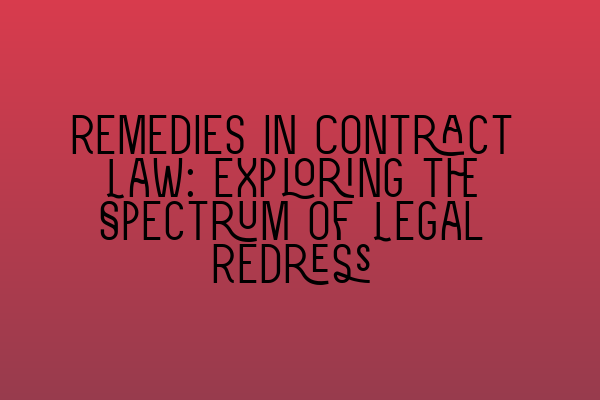Remedies in Contract Law: Exploring the Spectrum of Legal Redress
Disclaimer: The following article does not constitute legal advice. For specific legal inquiries, it is recommended to consult a qualified solicitor.
Contracts are an essential part of modern society, governing numerous transactions and relationships. While most contracts proceed smoothly, sometimes disputes arise, necessitating the need for legal redress. In such cases, remedies in contract law play a crucial role in resolving the conflicts and providing fair compensation to the aggrieved party.
In this comprehensive guide, we will explore the spectrum of legal remedies available in contract law, helping you understand the various options for seeking redress if a contract is breached.
1. Introduction to Contract Law and Breach
Before delving into remedies, it is important to grasp the fundamentals of contract law and breach. A contract is a legally binding agreement between parties, creating rights and obligations. When one party fails to fulfill their obligations as outlined in the contract, it is considered a breach.
Breach of contract can occur in various forms, such as non-performance, defective performance, or anticipatory breach. Each type of breach triggers different remedies, designed to address specific issues.
2. Types of Remedies
When a contract is breached, there are several types of remedies available in contract law to restore the injured party to their rightful position. These remedies can be broadly categorized as:
- 1. Damages: Damages are the most common remedy sought in contract law cases. They aim to compensate the injured party for the losses suffered as a result of the breach. Damages can be further divided into:
- a) General Damages: These are non-specific damages that aim to compensate for losses that naturally flow from the breach.
- b) Special Damages: Special damages are specific and quantifiable losses incurred due to the breach, such as loss of profits or additional costs incurred.
- 2. Specific Performance: In some cases, monetary compensation may not suffice to remedy a breach. Specific performance provides an alternative remedy, requiring the breaching party to fulfill their obligations as per the contract’s terms.
- 3. Restitution: Restitution is a remedy designed to undo the effects of a contract. It seeks to restore the parties involved to the position they were in before the contract was formed, returning any benefits received under the contract.
- 4. Rescission: Rescission allows a contract to be cancelled, effectively nullifying its terms. This remedy is usually sought when the contract was entered into fraudulently, under duress, or based on a mistake.
- 5. Injunction: An injunctive remedy is a court order that prohibits or compels certain actions. In contract law, an injunction may be sought to prevent a party from breaching the terms of the contract or to enforce specific obligations.
Each remedy serves a distinct purpose and may be more suitable depending on the specific circumstances of the breach.
3. Factors Influencing the Choice of Remedies
When selecting a particular remedy, several factors should be taken into account to ensure an appropriate and effective resolution. These factors include:
- 1. Feasibility: The feasibility of a remedy depends on various factors such as the nature of the contract, availability of specific performance, or the practicality of restitution.
- 2. Legal Principles: Legal principles, such as foreseeability of damages or the balance of convenience, may influence the choice of remedy.
- 3. Proportionality: The remedy sought should be proportionate to the breach committed. The court will consider whether the same objectives can be achieved through a lesser remedy.
- 4. Adequacy: The remedy should adequately compensate the injured party for the losses suffered and place them in the position they would have been in had the breach not occurred.
Considering these factors will assist in determining the most appropriate course of action and increase the chances of a successful outcome in resolving the contractual dispute.
4. Conclusion
Remedies in contract law offer the means to address breaches and provide legal redress for the injured party. Understanding the spectrum of available remedies ensures that individuals and businesses can assert their rights and seek fair compensation when contracts are breached.
If you find yourself facing a breach of contract, it is advisable to consult with a qualified solicitor to navigate the complexities of contract law and identify the most appropriate remedy for your circumstances.
For more information on SQE Contract Law and related topics, please check out the following articles:
We hope this article has shed light on the spectrum of legal remedies available in contract law and highlighted the importance of seeking appropriate redress in case of a breach. Remember to consult a solicitor for personalized advice tailored to your specific situation.
